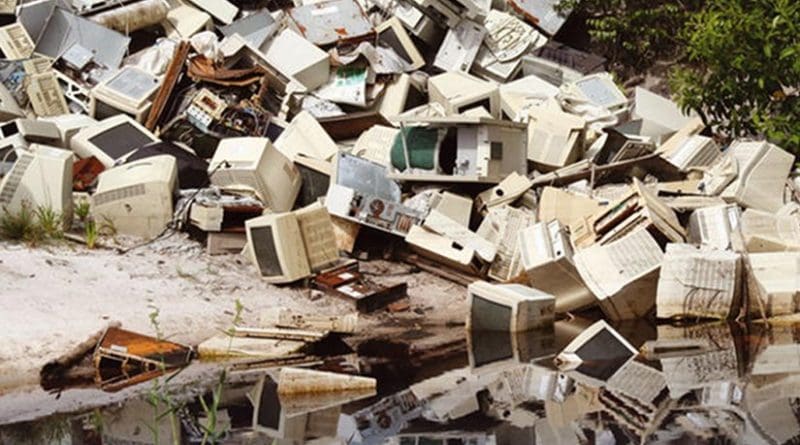INTERPOL-Coordinated EU Project Outlines Roadmap Against Unregulated e-Waste
A comprehensive two-year investigation into Europe’s used and waste electronics market has concluded that illicitly traded or unregulated e-waste within the region represents some 10 times the quantity of undocumented e-waste exported from Europe.
The European Union-funded project, Countering WEEE (waste electrical and electronic equipment) Illegal Trade (CWIT), was coordinated by INTERPOL, in collaboration with the United Nations University (UNU), the United Nations Interregional Crime and Justice Research Institute, the WEEE Forum, the Cross-Border Research Association, Zanasi & Partners and Compliance and Risks.
The research found that more than 10 times the 400,000 tonnes of e-waste exported ‒ some 4.7 million tonnes ‒ was wrongfully mismanaged or illegally traded within Europe itself.
In addition, the widespread theft of valuable components such as circuit boards and precious metals from waste electronics results in a serious loss of materials and resources for compliant waste processors in Europe. This annual estimated loss is valued at between EUR 800 million and €1.7 billion (USD 877 million to 1.86 billion).
“Electronic and electrical equipment represents the fastest-growing flow of the world’s waste streams. The weight of Europe’s mismanaged e-waste alone equals that of a 10 meter high brick wall stretching from Oslo to the toe of Italy. Valuable metals and components, including critical raw materials, need to be safely captured and recycled to the fullest possible extent,” said Pascal Leroy, Secretary-General of the WEEE Forum.
With national surveys by INTERPOL showing that on average each year only 2,000 tonnes (0.5%) of EU e-waste exports were reported as having been stopped in operations leading to some form of sentencing, administrative fines or civil penalties, the report notes that 30% of EU members have not implemented stringent regulations required by the latest version of the EU WEEE directive and that national penalties for infractions are insufficiently high enough to have deterrent value.
“The unique value of the project is the simultaneous provision of both facts and market analysis, as well as detailed scrutiny of the legal framework and the law enforcement chain. The dedicated roadmap developed for improving collection and treatment of e-waste in Europe will be a valuable result for all parties involved,” said Jaco Huisman of the United Nations University, and Scientific Coordinator of the CWIT project.
Highlighting cases of fraud, tax evasion and money laundering, the CWIT project also suggests harmonizing penalties to simplify enforcement in trans-border cases, and to prevent criminals from shifting activities to lower-risk countries within the EU where legal and financial penalties for illicit e-waste trade vary greatly from country to country.
“The study shows that as a profitable activity, with low risk of detection, the illicit trade in e-waste is vulnerable to exploitation, which governments can prevent more by employing a balanced mix of administrative and criminal penalties reflecting the value of illicit profits, as well as the large environmental and social harm involved. The law enforcement community needs to be more pro-active with illicit e-waste investigations, complemented by strengthened prosecution and sentencing,” said David Higgins, Assistant Director of INTERPOL’s Environmental Security Sub-Directorate.
Markus Müller, Research Programme Officer with the Research Executive Agency (REA),European Commission, said: “Environmental crime is an increasingly serious threat for the world we live in as it adversely affects both our natural resources and societies. Based on a deep understanding of the legal and illegal streams of electronic waste, the CWIT project has succeeded in formulating concrete recommendations to improve the compliance with existing recycling policies and to prevent criminal activities based on non-compliant treatment or traffic of e-waste.”
In this respect the project recommends a multi-stakeholder approach and outlines a roadmap to reduce illegal e-waste trade, including the establishment of an Operational Intelligence Management System to promote and support intelligence-led enforcement, as well as of a National Environmental Security Task Force (NEST), formed by different authorities and partners, to enable a law enforcement response that is cooperative, collaborative and coordinated at national, regional and international levels, and led by a team of specialized experts.

